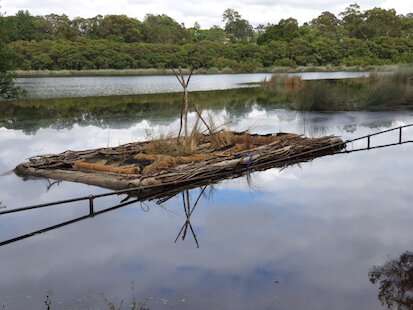Global turtle study highlights extinction risk and roadmap to recovery

A Western Sydney University researcher has contributed to the first global and comprehensive assessment of the world's turtle and tortoise species. The study found half of all 360 turtle and tortoise species worldwide face imminent extinction, but action undertaken now could reverse the decline and save many species.
Published today in Current Biology, 51 experts with the International Union for Conservation of Nature's (IUCN) Tortoise and Freshwater Turtle Specialist Group, are calling for the end of the trade of wild turtles for food and pets as key to a global conservation strategy.
Hundreds of thousands of turtles and tortoises are collected for the wildlife trade every year. Turtles and tortoises are long-living and slow-growing species, which means they can't reproduce fast enough to replenish populations that are taken from the wild. Three species of turtles and tortoises have gone extinct in the last two centuries, but that number will climb if the trade isn't curbed.
Co-author, Associate Professor Ricky Spencer from the School of Science at Western Sydney University, said Australia is not immune to the impacts of turtle trading, and attacks from invasive predators, road mortality, habitat destruction and drought, are all factors contributing to the decline of Australia's most common turtle species by up to 91 per cent.
"In Australia, we are seeing no signs of turtles in some areas, where we previously recorded them in huge numbers. Foxes are the main persistent source of predation, with growing urbanisation, poor water quality and habitation destruction compounding the issues turtles face," explained Associate Professor Spencer.
"The exotic pet trade and illegal smuggling of wildlife both in and out of Australia is also a contributing factor. It is big business."
The study reinforces the essential roles turtles play in the world's ecosystems. They provide critical services such as energy flow, nutrient recycling, scavenging, soil dynamics and seed dispersal in the terrestrial, freshwater, and marine ecosystems in which they occur.
"The research we are conducting at the Experimental Wetland Facility on the University's Hawkesbury campus shows that without turtles in our rivers, water quality would reach toxic levels during our hot summers. During the recent fish kills in the Murray-Darling River system, turtles were likely instrumental in cleaning up the river," said Associate Professor Spencer.
The researchers recommend captive breeding and head starting programs as ways to help certain species of turtles and tortoises. But to be effective, there must be natural habitat remaining to release the animals into. Species like the Australian western swamp turtle were rescued from near extinction by captive breeding efforts, but it is difficult to breed some species in captivity.
Associate Professor Spencer believes community education is also important for bolstering turtle numbers, and should go hand in hand with conservation programs. Programs like the 1 Million Turtles Community Conservation Program and TurtleSAT are implementing a range of conservation strategies, including Turtles in Schools programs, nesting island creation and will launch a National Predation Survey. Stakeholders include Western Sydney University, Australian Reptile Park, Aussie Ark, Foundation for National Parks and Wildlife and community conservation groups.
"We can't wait for turtles to be listed as endangered to act, and that is where community conservation efforts come in. It is not commonly known, but most turtles under threat are species found in backyards and reserves, so there is an opportunity for people to get involved with local organisations and help reverse the decline," said Associate Professor Spencer.
According to Professor Craig Stanford, the paper's lead author from the University of Southern California, and Chair of the IUCN SSC Tortoise and Freshwater Turtle Specialist Group: "A long slow life trajectory worked for them for millions of years, but it doesn't serve them well in the modern world in the face of humans poaching them and destroying their habitat."
More information: Craig B. Stanford et al. Turtles and Tortoises Are in Trouble, Current Biology (2020). DOI: 10.1016/j.cub.2020.04.088
Journal information: Current Biology
Provided by Western Sydney University





















